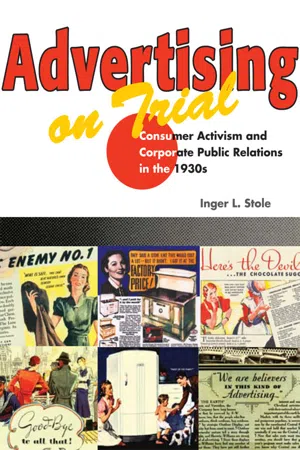
eBook - ePub
Advertising on Trial
Consumer Activism and Corporate Public Relations in the 1930s
- English
- ePUB (mobile friendly)
- Available on iOS & Android
eBook - ePub
About this book
In the 1930s, the United States almost regulated advertising to a degree that seems unthinkable today. Activists viewed modern advertising as propaganda that undermined the ability of consumers to live in a healthy civic environment. Organized consumer movements fought the emerging ad business and its practices with fierce political opposition.
Inger L. Stole examines how consumer activists sought to limit corporate influence by rallying popular support to moderate and change advertising. Stole weaves the story through the extensive use of primary sources, including archival research done with consumer and trade group records, as well as trade journals and engagement with the existing literature. Her account of the struggle also demonstrates how public relations developed in order to justify laissez-faire corporate advertising in light of a growing consumer rights movement, and how the failure to rein in advertising was significant not just for civic life in the 1930s but for our era as well.
Frequently asked questions
Yes, you can cancel anytime from the Subscription tab in your account settings on the Perlego website. Your subscription will stay active until the end of your current billing period. Learn how to cancel your subscription.
No, books cannot be downloaded as external files, such as PDFs, for use outside of Perlego. However, you can download books within the Perlego app for offline reading on mobile or tablet. Learn more here.
Perlego offers two plans: Essential and Complete
- Essential is ideal for learners and professionals who enjoy exploring a wide range of subjects. Access the Essential Library with 800,000+ trusted titles and best-sellers across business, personal growth, and the humanities. Includes unlimited reading time and Standard Read Aloud voice.
- Complete: Perfect for advanced learners and researchers needing full, unrestricted access. Unlock 1.4M+ books across hundreds of subjects, including academic and specialized titles. The Complete Plan also includes advanced features like Premium Read Aloud and Research Assistant.
We are an online textbook subscription service, where you can get access to an entire online library for less than the price of a single book per month. With over 1 million books across 1000+ topics, we’ve got you covered! Learn more here.
Look out for the read-aloud symbol on your next book to see if you can listen to it. The read-aloud tool reads text aloud for you, highlighting the text as it is being read. You can pause it, speed it up and slow it down. Learn more here.
Yes! You can use the Perlego app on both iOS or Android devices to read anytime, anywhere — even offline. Perfect for commutes or when you’re on the go.
Please note we cannot support devices running on iOS 13 and Android 7 or earlier. Learn more about using the app.
Please note we cannot support devices running on iOS 13 and Android 7 or earlier. Learn more about using the app.
Yes, you can access Advertising on Trial by Inger L. Stole in PDF and/or ePUB format, as well as other popular books in Business & Advertising. We have over one million books available in our catalogue for you to explore.
Information
Publisher
University of Illinois PressYear
2010Print ISBN
9780252072994, 9780252030598eBook ISBN
9780252092589Table of contents
- Cover
- Title Page
- Copyright
- Contents
- Preface
- 1. The Rise of a Corporate Culture: Early Consumer Response
- 2. Advertising Challenged: The Creation of Consumers’ Research Inc. and the Rise of the 1930s Consumer Movement
- 3. The Drive for Federal Advertising Regulation, 1933–35
- 4. A Consumer Movement Divided: The Birth of Consumers Union of the United States Inc.
- 5. Defining the Consumer Agenda: The Business Community Joins the Fray
- 6. Legislative Closure: The Wheeler-Lea Amendment
- 7. Red-Baiting the Consumer Movement
- Epilogue
- Appendix A: Key Players
- Appendix B: Legislative Developments, 1933–38
- Notes
- Index